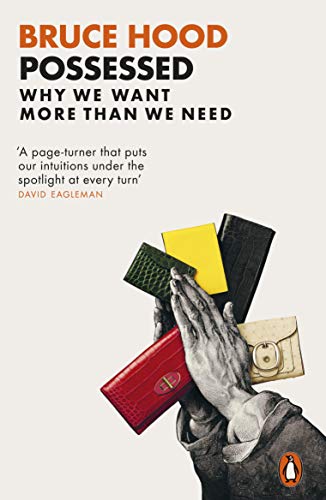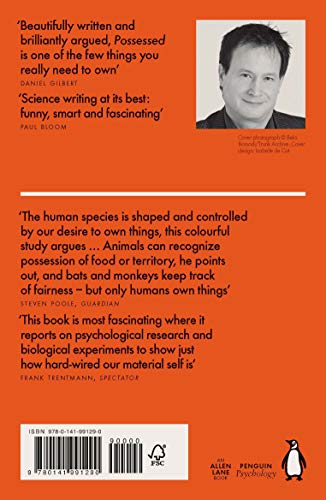Customer Services
Copyright © 2025 Desertcart Holdings Limited
Desert Online General Trading LLC
Dubai, United Arab Emirates



Possessed: Why We Want More Than We Need
H**Z
Give it up
This is a thinking man’s Marie Kondo. Kondo tells us to minimise our possessions. Hood explains why we have the urge to possess. From the grand picture of capitalism gone wild, a scene in which we see ourselves consuming more than we need ‘in the full knowledge that we are acting irresponsibly towards future generations because of the limited resources we are using up’, a denial of the same level of prosperity to poorer nations, to the individual desire to possess and own – teddy bears and blankets, attachment toys, the point is clear, we need to desire less. From the point of view of psychology, Hood examines Western and Eastern behaviour and thinking. Easterners are brought up to think collectively, unlike Western emphasis on individualism. Hood explains two important things from this base. First, he explains the apparent contradiction when we see rich Asians buying luxury goods. He explains this by pointing out that apart from East-West thinking, there is also a vertical and horizontal perspective in both cultures. In cultures with vertical structure, competition is seen as a positive spur. Secondly, Eastern culture puts group before self, and thus incline to thinking about duty and self-sacrifice. Children in Eastern societies tend to share more fairly and generously than children in Western societies. Possession, is not the same as ownership. Animals possess, but humans own. Hood points out that ownership is not simply a moral or political issue, it reveals something about what motivates us at our core; after all, ownership is what holds society together, Hood says. ‘Ownership is incentive’. The correlation between ownership and sharing is important because is affects how we distribute wealth. Hence, it is not just important to share, but to know what lies at the core when we think and feel about sharing, and that in turn, is concerned with what we own and why we own. This book is a macro as well as a micro examination, not only of social behaviour, but also decision-making in economics.
A**E
A rambling, incoherent collection of anecdotes
The author should be profoundly ashamed of this weak, rambling, incoherent book. The question he asks is fascinating (Why do we want more than we need?), but he isn't overly concerned with actually answering it. Instead, he treats the reader to a smorgasbord of anecdotes that are only ever so slightly relevant to his subject, as if hoping that no one will notice that the book doesn't really do what it says on the tin.For example, I agree that the story of Marcel Duchamp's urinal exhibited as an art piece is amusing (and thanks for including the photo), but surely its connection to the subject matter is tenuous at best? And even though I by and large share the author's political views, I am not sure I purchased the book to read his musings on Brexit and Donald Trump, whom he mentions more often than Kahneman and Tversky.Many of the studies cited in 'Possessed' are of interest, but its fatal flaw is the lack of clear structure. It seemed to me as though, having committed to writing this book, Bruce Hood realised that its principal arguments could be laid out in five pages at most (namely, that we are biologically wired to accumulate property as an expression of our status within society, and that the pursuit of status thrills us even though it brings no happiness in the long run). And so, like a bad student, he had to pad it up with the random assemblage of stories and half-baked ideas. Too bad!
M**J
Interesting Read
Well-researched and worth the read. Led to some reflection on separating our needs from our desires to possess.
L**N
the psychology of consumerism?
This is the first Bruce Hood book I have read, and I must admit that I was probably reading it for the wrong reasons. I was looking for answers, for the ‘and what can we do about it’ bit. This book does serve up a great deal of interest, and explains for the layperson, ‘how ownership came to control us’; its conclusions (or epilogue) offer nothing that most of us don’t already know. It's a timely, engaging analysis of some of the elements of human psychology that have led to our being possessed by the need to possess.So, what’s it all about? Hood takes us on a journey that looks at the difference between possession and ownership. This is the central theme. He offers up a large variety of scientific experimentation and research in support of the premise that whilst many mammals have some notion of possession; only humans understand the infinitely more complex notion of ownership. Ownership, like many other aspects of human reality, is a construct (fiction, I’ve heard it termed elsewhere) that has been created in order to help us better organise and evolve. It seems to be a concept that most societies ‘need’ (with the exception of the few remaining hunter-gatherers) in order to function, and is fast becoming something by which the vast majority of our species define themselves.Much time is also spent looking at how early in our lives we come to understand the notion of ownership. This is also linked in with our attachments to objects, and how human beings have the propensity to form emotional bonds with them. Add to this the modern malaise (it’s not as clearly articulated where this comes from, perhaps?) that we define our sense of self by our accumulation of objects and it is effectively no wonder that we have become insatiable consumers. The final twist in the tale is the human desire for novelty – again, a result of our neurological chemistry – so that we quickly become habituated to new things and are always looking for the next thrill to get our synapses twitching.There’s a lot more going on as well, of course, in terms of notions of fairness and sharing, and how poor humans are at accurately evaluating all sorts of situations. Hood also points out the WEIRD bias and one of the more interesting elements for me was the cultural differences thrown up. Sadly the book is not quite free from the odd sexist trope. Boo.I found the epilogue trite: ‘we should live simpler, less cluttered, less competitive lives.’ Who doesn’t already know this? As Hood abundantly demonstrates, the science is categorical that our positive well-being depends upon it (and that of our planet). His parting thoughts about technological unemployment seem like they belong to a different book! He set out, as he acknowledges, ‘to have opened [y]our eyes to the personal reasons why we are possessed’. What else is there to say? I want to ask: what are we going to do about our obsession with ownership and its attendant role in the demise of our planet?There might be hope. I took that from the way that, in some of the experiments, it was just so easy to influence the human mind, and how quickly that could happen, and how it could effect a behavioural change. Advertising already knows this of course, but what if it was harnessed to tell us the reality of consumption, rather than feeding the collective delusion of happiness through owning the latest new thing? Hope might come from our adaptability, our complex relationship with fairness, and the chance that with a growing awareness in all sectors of the catastrophic effects of our addiction to things, we might yet learn to grow out of it.
I**E
Interesting but sprawling book - as the author acknowledges
As a member of the Amazon Vine programme and regular recipient of freebies, I was intrigued by the title of this book.I am a sucker for this sort of popular science/psychology, and generally enjoyed the book, although my main criticism would be that it strays away from its central theme too often (and too far) for such a short volume. The author acknowledges this at the end of the book, and while I do see how the detours into Trump and Brexit tie back into the main theme, this tieing-back should have been done a bit more rapidly, in my opinion. It is interesting how leavers in the Brexit debate were made to feel the "loss" of something (control), and the author does point out how humans feel loss more piercingly than gains - and links this into our apparently insatiable desire (or is it a need?) to keep buying.When the author is on topic, there are piles of insights. I've come across closely related ideas before, but Hood uses them in a different way. He looks at our brain responses when we buy (and lose) things, and ties our desire to acquire back to the historical foundations of society (in establishing communities, and in ensuring intergenerational continuity), and to evolution. Just as peacocks have feathers to attract mates, we have possessions so that we can "peacock" towards others, projecting how successful we are and how great a mate we would make.It's an intriguing and wide-ranging read, although it perhaps ranges a bit too far in the middle. That said, the final chapters really tie everything together, and anyone with an inquisitive mind won't really begrudge Bruce Hood his peregrinations. This book will appeal to fans of Paul Dolan and Vincent Deary.
Trustpilot
1 day ago
4 days ago